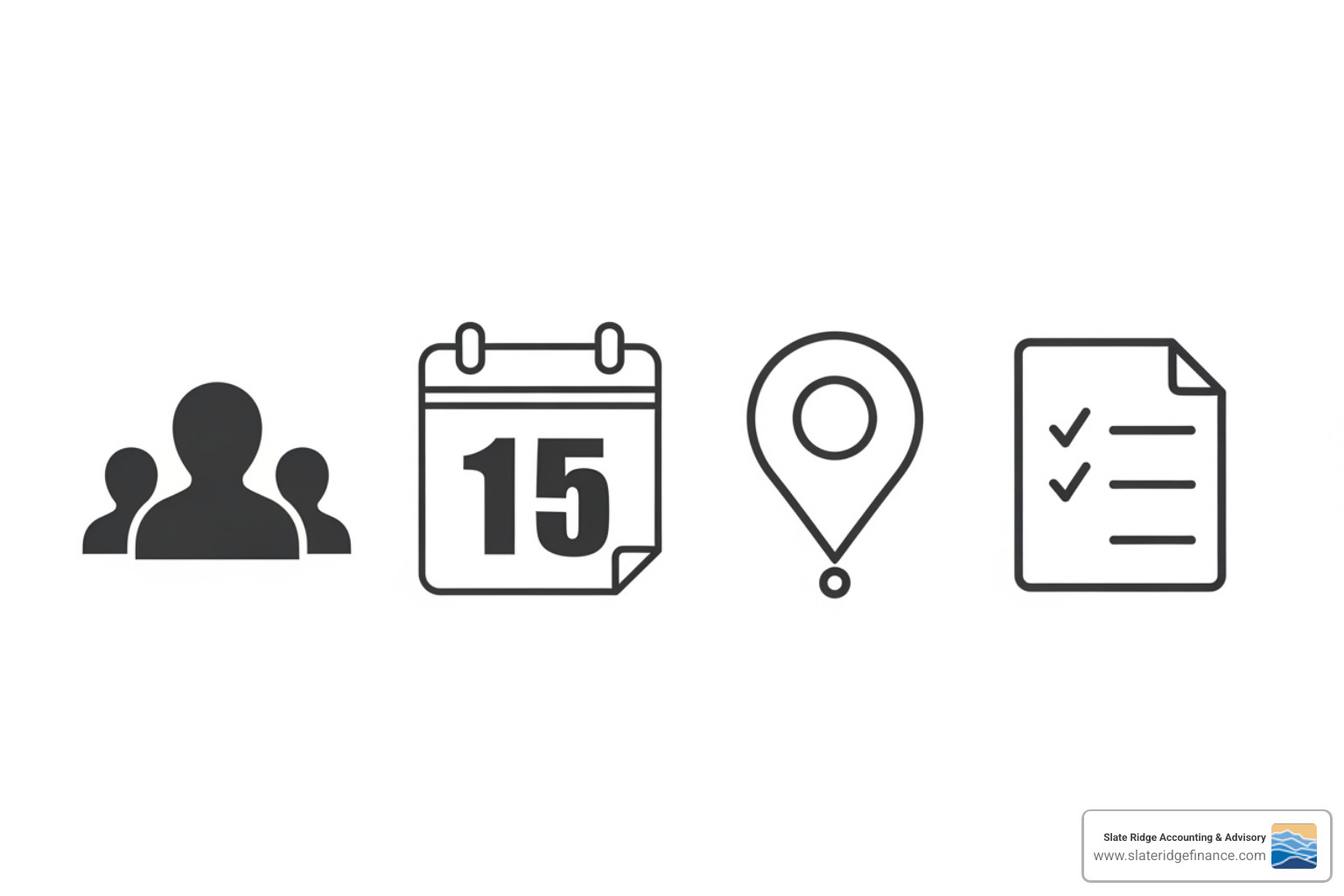Why Understanding Payroll Costs Matters for Your Small Business
The cost of payroll services for small business can vary dramatically, but understanding the basics is key. Here's a quick overview:
Quick Answer: Typical Payroll Service Costs
| Business Size | Monthly Cost Range | What's Included |
|---|---|---|
| 1-10 employees | $76 - $150/month | Basic payroll processing, tax filing, direct deposit |
| 11-25 employees | $175 - $250/month | Full-service payroll, employee self-service, tax compliance |
| 26-50 employees | $236 - $400/month | Premium features, HR support, benefits administration |
Pricing Structure: Most providers charge a base fee ($20-$150/month) plus a per-employee fee ($4-$15/month per person).
Paying employees correctly is a legal requirement, yet the IRS fines 40% of small businesses annually for payroll errors. The process is complex, involving wage calculations, tax withholding, and compliance with changing regulations, making mistakes easy and costly.
The good news is you don't have to handle it alone. Outsourcing payroll can save you money, with businesses that outsource spending 27% less than those doing it in-house. The true cost of DIY payroll isn't just your time; it's the risk of penalties, software costs, and errors that can erode employee trust.
This guide breaks down payroll service pricing, what's included in different packages, how to spot hidden fees, and how to choose a solution that fits your budget without sacrificing quality.
Easy cost of payroll services for small business glossary:
In-House vs. Outsourced Payroll: A Cost-Benefit Analysis
Every small business owner faces the choice: handle payroll in-house or outsource it? While keeping control seems appealing, the hidden costs of DIY payroll quickly add up.

Many owners start with spreadsheets, only to find payroll is more complex than expected. The DIY approach seems free, but it costs you hours each pay period—hours that could be spent growing your business. Payroll software is an improvement, automating calculations and some tax filings, but you're still responsible for managing the system and any errors.
Full-service outsourcing is a game-changer. When you partner with a professional Payroll Management Services provider, you're hiring experts to handle everything. Some businesses even use Professional Employer Organizations (PEOs) for comprehensive payroll, benefits, and HR administration.
Comparing the cost of payroll services for small business to in-house processing
The real cost of payroll services for small business goes beyond a monthly fee. Hiring a full-time payroll specialist costs over $64,000 annually, plus benefits and overhead. Even if you do it yourself, your time has value. Add the risk of penalties—the IRS fines 40% of small businesses for payroll errors—and the "savings" from DIY quickly disappear.
Research shows businesses that outsource payroll spend 27% less than those handling it in-house. This isn't just about service fees being lower than a salary; it's about avoiding costly mistakes, saving time, and gaining expertise. Outsourcing converts an unpredictable expense into a fixed, manageable monthly cost with far less risk.
What's included in a typical payroll service package?
A good payroll service handles all the complexities behind the scenes. Core features typically include:
- Wage Calculation: Correctly calculates regular hours, overtime, bonuses, and commissions.
- Tax Withholding & Filing: Manages federal, state, and local tax withholding and stays on top of changing regulations. The provider also handles quarterly tax payments and files year-end W-2s and 1099s.
- Direct Deposit: Provides reliable electronic paychecks for employees and contractors, eliminating paper checks.
- Employee Self-Service: Portals where staff can view pay stubs, download tax forms, and update personal information, saving you administrative time.
- Standard Reporting: Provides reports to track payroll expenses and labor costs, which can integrate with your accounting system for simpler bookkeeping.
These features combine to provide peace of mind, ensuring your team is paid correctly, taxes are filed on time, and your business remains compliant.
Key Factors That Determine the Cost of Payroll Services for Small Business
The cost of payroll services for small business isn't a fixed number; it's a custom quote based on your specific needs. Several key factors will shape your final bill.

Number of Employees and Contractors
Your team size has the most direct impact on cost. Most providers charge a base monthly fee plus a per-employee charge. As your team grows, the cost per person often drops due to volume discounts. Contractor-only payroll is typically simpler and less expensive, as it involves 1099s and fewer tax complications. This makes contractor-focused plans ideal for many businesses, especially those looking at Payroll Services for Startups.
Payroll Frequency
How often you run payroll affects your cost, especially if your provider charges per payroll run. According to the Bureau of Labor Statistics, biweekly is the most common pay cycle. A weekly schedule means more processing runs and higher costs compared to a bi-weekly or monthly schedule. However, some states have minimum pay frequency requirements you must follow.
Geographic Location and Complexity
If all your employees work in one state, payroll is relatively simple. However, with team members across multiple states, complexity and costs rise. Each state has its own tax rates and compliance rules, and thousands of local jurisdictions impose their own income taxes. Managing multi-state payroll requires tracking different withholding rates and filing in multiple jurisdictions. Most providers charge extra for this service, which is well worth the cost to avoid compliance headaches.
Level of Service and Add-Ons
Basic payroll covers wage calculations and tax filings, but most businesses benefit from add-on services. These extras increase the cost of payroll services for small business but can save significant time.
Popular add-ons include:
- HR tools: New hire reporting, PTO tracking, and employee onboarding.
- Benefits administration: Management of health insurance, retirement plans, and HSAs.
- Time tracking integration: Automatically syncs employee hours to payroll, reducing manual entry and errors.
- Software integration: Seamless connection with your accounting platform, like Cloud Accounting Services, provides a complete financial picture without duplicate data entry.
Decoding Payroll Pricing Models and Hidden Fees
Understanding how Business Payroll Companies structure their pricing is key to avoiding surprises. Pricing transparency helps you know exactly what you're paying for.
Common Pricing Structures
Most providers use a base fee plus per-employee charge. For example, a $50 base fee plus $5 per employee for a 10-person team would be $100 per month. Our research shows this typically ranges from $76 to $150 monthly for businesses of this size.
Other models include a per-employee flat rate (e.g., $10 per person, so $100/month for 10 employees) or a percentage of payroll, though the latter is less common for small businesses. The key is to calculate the total cost for your specific team size to see which model is most economical.
Spotting Hidden Fees and Additional Charges
That advertised monthly rate rarely tells the whole story. The true cost of payroll services for small business often includes extra charges. Be on the lookout for:
- Setup/Implementation Fees: A one-time charge to get your account started.
- Year-End Tax Form Fees: Charges for preparing and filing W-2s and 1099s.
- Off-Cycle Payroll Runs: Fees for issuing checks outside your regular schedule (e.g., for bonuses).
- Tax Filing Fees: Extra costs for handling multiple state or local jurisdictions.
- Other Charges: Fees for direct deposit, paper checks, wage garnishments, or premium customer support.
Valuable add-ons like HR tools and benefits administration are almost always priced separately. The best defense is to ask for a complete breakdown of all potential fees in writing before you sign a contract.
Estimating the cost of payroll services for small business based on size
Using a common model ($50 base + $5 per employee), costs scale with your business:
- 10-employee business: Around $100/month (falls within the typical $76-$150 range).
- 25-employee business: Roughly $175/month (aligns with the $175-$250 market range).
- 50-employee business: About $300/month (fits the $236-$400 expected range).
Notice the economy of scale: the effective cost per employee decreases as you grow. At 10 employees, you're paying $10 per person, but at 50, it's just $6 per person. This makes outsourcing increasingly efficient as your business expands.
How to Choose a Cost-Effective Payroll Solution
Finding the right payroll service isn't about finding the cheapest option; it's about finding the best value. A cost-effective solution saves you time, protects you from errors, and supports your financial goals.

Step 1: Assess Your Business Needs
Before comparing providers, look inward. A payroll service should grow with you, not hold you back. Consider these points:
- Team Size & Type: How many W-2 employees and contractors do you have? What are your hiring projections?
- Budget: What can you realistically afford? Remember to factor in the cost of potential errors or your own time with a DIY approach.
- Essential Features: Do you just need basic payroll, or do you require HR tools, benefits administration, or multi-state capabilities?
- Internal Expertise: Do you have the bandwidth to manage parts of the process, or do you need a full-service, hands-off solution?
Choosing a scalable partner is like finding the right Bookkeeping Service for Small Business—it's about planning for where you're headed.
Step 2: Evaluate Service Offerings and Integrations
Once you know your needs, evaluate what providers offer. Every service should handle core features like wage calculation, tax withholding, and direct deposit. Beyond the basics, look for:
- HR & Benefits Support: Can the service help you manage health insurance, 401(k) plans, and other perks that attract talent?
- Accounting Software Integration: This is critical. When your payroll service syncs with your Accounts for Small Business software, you eliminate manual data entry and get a complete, accurate financial picture.
- Compliance Support: A good provider stays on top of changing tax laws and may even offer tax penalty protection, saving you from costly IRS fines.
Step 3: Request Detailed Quotes and Scrutinize Contracts
Now it's time to understand the true cost of payroll services for small business. Ask for a full cost breakdown showing the base fee, per-employee charges, and any potential add-on costs. Inquire about price-lock guarantees to protect against rate increases.
Pay close attention to contract length, renewal policies, and cancellation terms. Look for flexibility and be wary of hefty termination penalties. Finally, read the fine print for hidden fees. A reputable provider will welcome your questions and provide clear, straightforward answers before you sign.
Frequently Asked Questions about Payroll Service Costs
Here are answers to common questions about the cost of payroll services for small business.
Are payroll services worth it for a very small business?
Yes. Even with just one or two employees, payroll involves complex tax calculations and compliance risks. The IRS doesn't care how small your business is; mistakes lead to penalties. Outsourcing provides:
- Time Savings: Frees you up to focus on growing your business.
- Error Reduction: Experts handle calculations and filings, dramatically lowering your risk of fines.
- Peace of Mind: Knowing payroll is handled correctly removes a significant source of stress.
When you weigh the service fee against the risk of penalties—which can easily exceed a year's worth of fees—it's a smart investment.
How do you calculate the total cost of an employee?
The true cost of an employee is much higher than their salary. A common rule of thumb is that payroll costs can be 1.25 to 1.4 times base pay. The total cost includes:
- Gross Wages: Salary or hourly pay, plus bonuses and paid time off.
- Employer-Paid Taxes: Your share of FICA (7.65%), plus federal (FUTA) and state (SUTA) unemployment taxes.
- Benefits Contributions: Your portion of health insurance premiums, retirement plan matching, etc.
- Workers' Compensation Insurance: Varies by industry and role.
- Administrative Costs: The cost of payroll services for small business or internal staff time.
So, a $50,000 employee actually costs you between $62,500 and $70,000. Understanding this is crucial for budgeting and pricing.
Can I switch payroll providers mid-year?
Yes, you can switch providers mid-year, but it requires careful coordination. The key is a clean data migration and mid-year tax reconciliation. Your new provider will need all historical payroll data for the current year, including year-to-date wages, taxes, and deductions for each employee.
While possible anytime, switching at the end of a quarter simplifies tax reconciliation. A reputable service will have a clear process for mid-year transitions to ensure there are no gaps in your tax filings. We've helped many clients steer these transitions smoothly, ensuring their payroll never misses a beat.
Gain Financial Clarity and Control Your Payroll Costs
Understanding the cost of payroll services for small business puts you in control. By knowing what drives costs—employee count, pay frequency, complexity, and service level—you can choose a solution that fits your budget and goals. It's not about finding the cheapest option, but the right fit that saves time, prevents errors, and ensures your team is paid accurately.
For many small businesses, outsourcing payroll is a strategic move that provides peace of mind and frees you to focus on growth. But payroll is just one piece of your financial puzzle. How it affects cash flow, budgeting, and planning requires a holistic view.
At Slate Ridge Accounting & Advisory, we bring clarity to these financial decisions for businesses in North Carolina and beyond. Our virtual accounting services are designed to help you see the full picture, track what matters, and make informed decisions that support your long-term success.
You've done the work to understand your options. Now, take the next step to gain control.
Take control of your finances with our Virtual Accounting services.
Ready to get started?
Book a free consultation today and let’s explore how Slate Ridge can support your business with expert accounting that’s accurate, timely, and built around your goals.






